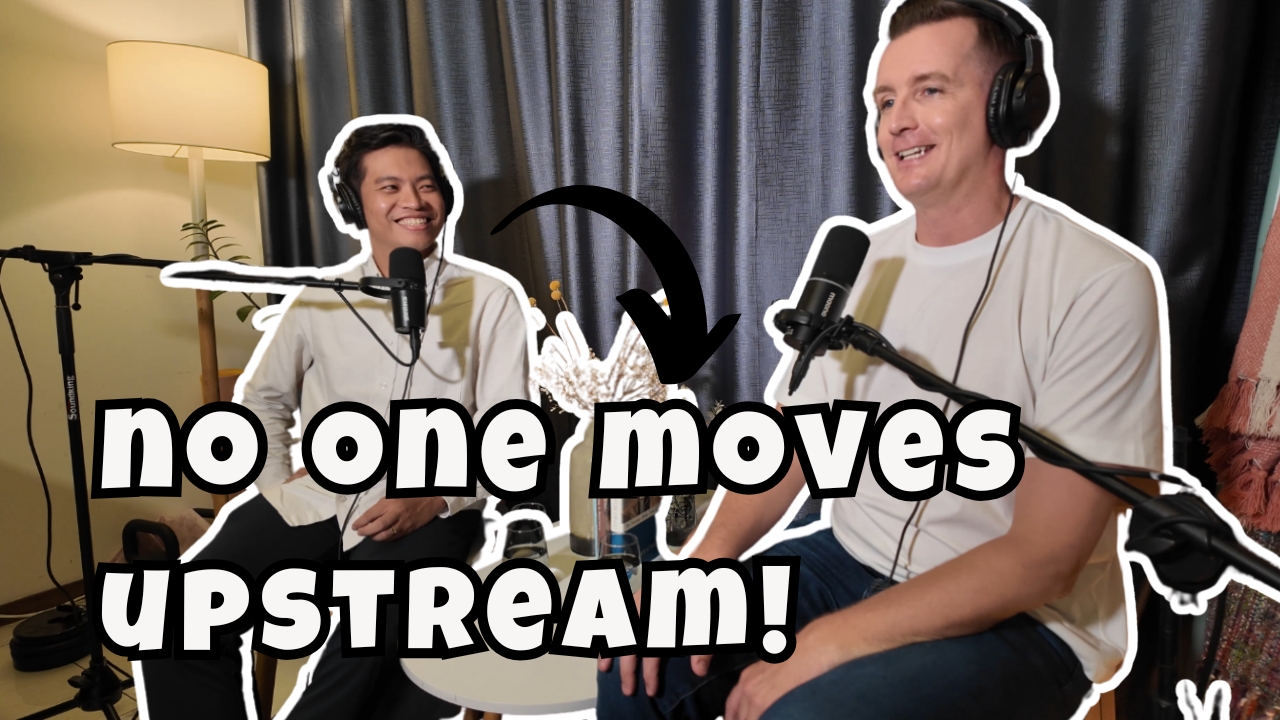This is me, Niall Mackay, founder of Seven Million Bikes Podcasts. I am the host of this show, A Vietnam Podcast, sharing stories and insights about Vietnam.
My guest today is Viet Anh, he’s an amazing designer with a sharp eye and a great sense of humor. Originally from the north of Vietnam, he’s now based in Saigon, married to someone from Đà Lạt, and works for an Englishman, which gives him a pretty unique perspective on all those different worlds.
We explored different perspectives, from the nuances of regional differences within Vietnam to the complexities of expat life and Vietnamese perceptions of foreigners.
A Journey Through Vietnam—From Childhood to Career
Viet Anh grew up in a rural part of northern Vietnam, then moved to a city an hour away for secondary school before finally landing in Hanoi for high school. So even as a kid, he was used to relocating and adapting to new environments. That early experience probably explains a lot about how comfortable he is navigating between different worlds today—rural vs. urban, north vs. south, local vs. foreign.
He described the cultural differences between North and South Vietnam in a way that really resonated. The north, he said, tends to be more political and slow-paced in the workplace. It’s not always about how good you are at your job—it’s often about who you know. The south, on the other hand, is much faster-moving and energetic, with a “get-it-done” attitude.
Even something as simple as going home for Tết became a metaphor for these contrasts. For years, Viet Anh had to travel a full 12 hours—first by plane from Saigon to Hanoi, then by car or bus—to reach his hometown. It wasn’t easy, but it was tradition. And like many traditions, it speaks volumes about values, family, and what people are willing to do to stay connected.
More Story: Vietnamese American Woman On A MISSION To Transform The Coffee Industry
Culture Shocks, Podcasting, and Learning English
We also talked about how he learned English. While I’ve lived in Vietnam for over a decade and still struggle to count to ten in Vietnamese, Viet Anh essentially grew up learning English from the internet, mainly through YouTube. He picked up not just the language, but also a variety of accents and cultural nuances just by listening and absorbing.
Viet Anh pointed out that native English speakers have the “privilege” of not needing to learn another language. Most of the content we consume is already in English. But for Vietnamese people back then, a lot of the interesting stuff – movies, music, entertainment – was foreign and in English, so they kind of had to learn it.
Expats, Stereotypes, and Cultural Growth
At one point, we got into the topic of how foreigners experience Vietnam, especially expats in Saigon. We reminisced about the early days when going to the cinema here meant people would talk during the movie—or even answer their phones. Back then, it drove expats mad (I probably ranted about it online once or twice). But over time, that behavior changed. Turns out, a lot of the talking wasn’t rudeness—it was just one person helping another keep up with fast English subtitles.
That realization hit me. It reminded me how easy it is for foreigners to judge local habits without understanding the context. And unfortunately, you still see that knee-jerk negativity online today, especially in expat Facebook groups. But more people are starting to realize that these kinds of judgments do more harm than good.
Stereotypes about Foreigners
One of the big ones? That all foreigners are wealthy.
Now, let’s rewind to a moment about ten years ago. A friend of mine—a Vietnamese woman—started dating an expat. They’re now happily married with beautiful children. But back then, someone actually told the guy, “Be careful, she’s just trying to bag a foreigner.” I had never even heard that phrase before—“bag a foreigner.” Turns out, it was this stereotype floating around that some Vietnamese women were only dating foreigners because they thought we were all rich.
It’s wild because the reality couldn’t be further from the truth for most of us. I certainly didn’t come to Vietnam wealthy, and I’m still not rich.
What do Vietnamese people Think About Americans?
We continued our conversation with something deeper—Vietnam’s relationship with America. You might expect there to be a lot of resentment, given the war history. But Viet Anh said something that stuck with me: “Forgive, but don’t forget.”
He explained that most Vietnamese people understand the difference between the past and the present. The war is history, and today’s Americans aren’t responsible for what happened decades ago. In fact, Vietnam now works closely with the US on economic and political levels. It’s not about clinging to the past—it’s about building the future.
Being in Saigon for the Reunification Day parade this year really brought that home. The energy, the pride, the celebration—it wasn’t just about victory. It was about progress. And it felt like a privilege to witness it from the inside.
Conclusion
This offered a thought-provoking look at the cultural and social intricacies of Vietnam. We both gained a deeper understanding of the regional contrasts within the country, the challenges and perceptions surrounding the expat community, and the evolving relationship between Vietnamese and foreigners.
If you enjoy hearing about Vietnamese stories, follow for more!

